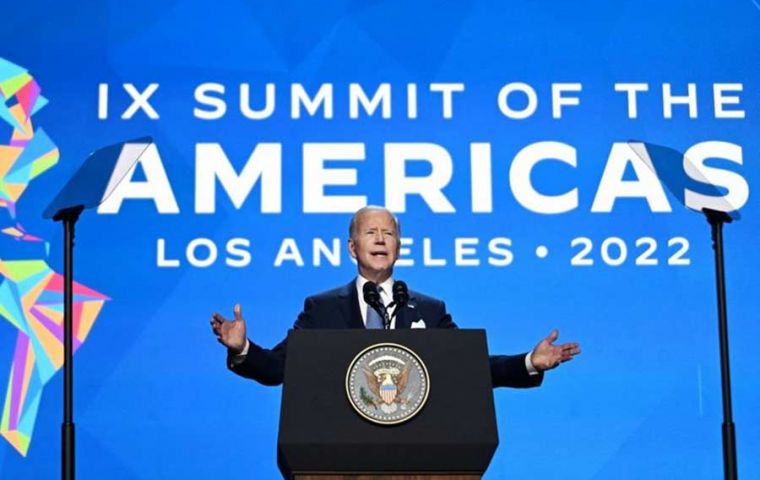MercoPress. South Atlantic News Agency
Biden highlights democracy's role at LA Summit
 “There is no reason why the Americas cannot be secure, prosperous, and democratic, from the north of Canada to the southern tip of Chile,” Biden argued
“There is no reason why the Americas cannot be secure, prosperous, and democratic, from the north of Canada to the southern tip of Chile,” Biden argued US President Joseph Biden underscored the importance of democratic rule throughout the Americas but made no reference to his decision not to invite Cuba, Venezuela, and Nicaragua to the IX Summit of the Americas held in Los Angeles through June 10.
During the opening ceremony, Biden stressed that democracy “is under assault throughout the world” and that the Inter-American Democratic Charter reflects the commitment of the countries of the region to the “promotion and defense” of that form of government anywhere.
“Let us come together again and renew our conviction that democracy is not only the defining feature of American history, but an essential ingredient of American futures,” Biden urged.
“At this summit, we have an opportunity to unite around bold ideas, ambitious action, and to demonstrate to our people the incredible power of democracies to deliver concrete benefits and make life better for all,” he added.
Following Washington's decision to exclude Cuba, Venezuela, and Nicaragua, the presidents of Mexico, Bolivia, and Honduras refused to attend the gathering of heads of state and sent their foreign ministers instead.
“There is no reason why the Americas cannot be secure, prosperous, and democratic, from the north of Canada to the southern tip of Chile. We have all the tools we need,” Biden went on, as he announced a partnership with Latin America and the Caribbean to boost the continent's economic prosperity to recover from the COVID-19 pandemic through the so-called Americas Partnership for Economic Prosperity, which seeks to promote an “equitable recovery” from the pandemic. The US also pledged over US$300 million in food insecurity aid.
Biden also proposed a reform to the Inter-American Development Bank (IDB) to give the private sector a greater role in the continent's development.
“Our region is large and diverse. We don't always agree on everything, but because we're democracies, we work through our disagreements with mutual respect and dialogue,” Biden also pointed out.
The other two regional heads of state skipping the gathering were Guatemala's Alejandro Giammattei, who was less specific about condemning the White House's decision to exclude Venezuela, Cuba, and Nicaragua, and Uruguay's Luis Lacalle Pou, who tested positive for COVID-19.
“The American Partnership will help economies grow from the bottom up and the middle out, not the top down,” Biden also said. “Trickle-down economics does not work.”
Unlike the Indo–Pacific Economic Framework (IPEF), the “economic vision” to counter Chinese clout that Biden launched in Tokyo in May with 13 countries on board, the Americas Partnership for Economic Prosperity has no country participation attached to it as of yet. Neither framework includes provisions such as tariff cuts and other market-access tools that Washington traditionally uses to incentivize partners. Many Latin American countries already have free trade agreements with Washington – including Chile, Colombia, Costa Rica, the Dominican Republic, El Salvador, Guatemala, Honduras, Mexico, Nicaragua, Panama, and Peru.
Others, including Argentina, Brazil, Ecuador, Paraguay, Uruguay, and several Caribbean nations, have signed on to less comprehensive Trade and Investment Framework Agreements with the US.




Top Comments
Disclaimer & comment rulesCommenting for this story is now closed.
If you have a Facebook account, become a fan and comment on our Facebook Page!